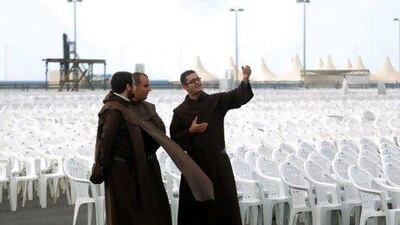BEIRUT // Security forces were on alert in Lebanon as the country, torn by conflicting attitudes towards the uprising in Syria and its own sectarian divide, prepared to receive Pope Benedict XVI today.
"The security agencies are on alert and the municipal services are on alert for the pope's visit, which will be one of the most successful visits in the history of modern Lebanon," said Marwan Charbel, the interior minister.
"There is no doubt we are living in a tough atmosphere in Lebanon, to some extent as a result of what is happening in Syria and what is happening around us, but the situation is under control ... and Lebanon is a stable country."
Cross-border shelling and shootings from Syria have become near-daily occurrences in recent months.
And there have been sporadic, deadly clashes in the port city of Tripoli between supporters and opponents of Syria's president, Bashar Al Assad.
But there is no danger of the pope being exposed to either of those potential risks.
During his visit, Pope Benedict will be moving only between Beirut - on the Mediterranean coast and 83 kilometres from Tripoli - and mountain villages just outside the capital.
He will also be nearly as far from the Syrian border.
Last month, a Jesuit priest who was recently forced to leave Syria over his support for the anti-Assad uprising, warned that the pope's safety could be at risk.
The pope "must ask for help from a secret service that can guarantee his security, because the Lebanese services are not sufficient in this situation", Father Paolo Dall'Oglio said.
But the Vatican stressed in August that the repercussions of the Syrian crisis and the kidnappings in Lebanon will not affect the pontiff's visit, his third to the region since becoming pope in 2005. He travelled to Israel and the Palestinian territories in 2009 and Cyprus the following year.
According to Mr Charbel, "every security apparatus will execute its role" to safeguard the first papal visit since the late pope John Paul II came to Lebanon in 1997.
The authorities have already "put the finishing touches" on a special security plan for the visit, which has been under preparation for the past three weeks, Mr Charbel said.
"Members of the intelligence and security forces have arrived from Italy in order to coordinate with one another and get an idea of the precautions that we have taken," he said, stressing that "the security forces will operate in coordination with the private security agencies of the pope".
The Maronite Christian Patriarch, Bishara Rai, said yesterday that not only the Lebanese state, but also international secret services and Lebanese intelligence agencies, will cooperate to prevent any possible attack.
And Father Abdo Abou Kasm, the visit's media coordinator, said last week that "all Lebanese security organisations are on a state of alert".
Addressing the tensions in the country, Fr Abou Kasm said the "fears surrounding the visit are out of place". He added: "All the communities welcome the pope's visit, both Muslim and Christian."
Yesterday, Naim Qassem, Hizbollah's deputy leader, received a delegation from the organising committee.
Mr Qassem emphasised that he welcomed the visit and that Hizbollah would participate in various receptions and meetings during it.
He urged all Lebanese to welcome the pope to show religious unity "away from any politics".
The pope is expected to arrive at Beirut's Rafiq Hariri International Airport this afternoon and travel to Harissa, where he will be staying.
The pope returns to Rome on Sunday evening.
Mr Charbel said all roads used by the pope will be closed to cars, and the army has announced that air traffic in the vicinity of the papal residence in Harissa would be forbidden from September 7 to17.
The army also warned there would be a "strict application of the decision ... to revoke all permits for carrying weapons in various Lebanese regions except for the bodyguards" of political and religious figures.

